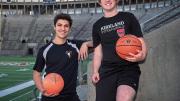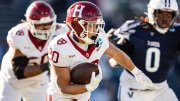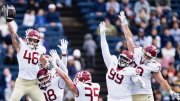On a windy evening in Harvard Stadium, a dozen cleated undergraduates step onto the turf for a high-stakes football game. While they warm up, the crowd is silent. In fact, there is no crowd. This is not The Game; it’s a Tuesday night intramural battle between Kirkland and Quincy Houses.
The winner of this matchup will earn 20 points toward the Straus Cup, the College’s year-long multi-sport intramural (IM) championship. Kirkland, seeking to repeat as champion, has built itself a sizable 200-point cushion over Quincy. As the season winds down, Kirkland is coasting to victory, but the competition remains fierce. Although the Cup may be the ultimate prize, it’s not why students participate.
When one of Quincy’s intramural coordinators, Tim Fargiano ’24, enrolled during the pandemic, he felt the void left by the absence of intramural sports. (The IMs in 2020-2021 were all virtual: video game competitions, chess tournaments, and self-logged running contests. Quincy took home that year’s title.) Instead, Fargiano played pickup soccer off-campus to make friends. Now a junior environmental science and public policy concentrator, he leads Quincy’s efforts to win back the Cup. “Last year, with the return from the pandemic, I think that a lot of the institutional knowledge about House events and House culture was lost,” he said. “This year, I really dove in. It’s a great way for me to both get to know people in the House and have fun.”
As an intramural coordinator, Fargiano wrangles Quincyites to show up for IM games in 17 sports leagues ranging from soccer, ultimate frisbee, and basketball to squash and broomball (ice hockey without skates, which unsurprisingly results in plenty of bumps and bruises). He also works on fielding teams for 14 special events such as inner-tube water polo, foosball, badminton, and foot races along the Charles. Beyond Fargiano’s purview is a separate IM system for first-years, since they have not yet been sorted into Houses.
In the face of this complexity, much like the rest of Harvard, intramurals rely on an intricate bureaucratic network. There are referees who manage other referees (both training and assigning), student schedulers who must consider varsity practices, class schedules, and each House’s overlapping intramural commitment, and student-led councils that decide which sports to play in future seasons and arbitrate their rules. Each cog in the intramural machine is turned by a zealously passionate student.
If intramurals were played exclusively by self-identified athletes, they would be distinctly un-fun and poorly attended (varsity athletes can’t play their own sports in IMs). To get people to turn out, House coordinators must explain that intramurals are more than sports. Fargiano’s Kirkland intramural coordinator counterpart (and thus his chief rival), Ethan Hooper ’25, likes to brand IMs as a lighthearted change of pace from the busy school world. “I feel like at Harvard, you’re constantly surrounded by the idea of having to do work,” he said. “But to say, ‘Hey, I’m gonna take a break and I’m gonna go do something I want to do’—I think that alone is really good motivation.”
Perhaps the best trait in an intramural athlete is an open mind. Hooper, a dual government and psychology concentrator, played football for 13 years, but rather than sticking to familiar territory, he tried out ultimate this year. Before the first match, he thought, “I’ll go run around for an hour and see what happens.” Then he ended up falling in love with it. When the field is full of people who, like Hooper, are new to a sport, team captains must strike a delicate balance between fun and competition. Act too nonchalantly, and the game ceases to be engaging. Act too invested, and the lighthearted spirit of competition sours.
Many intramural sports would best be described as running around for an hour. In the Kirkland-Quincy football game, the muscular quarterbacks chuck the ball downfield, consistently missing long passes instead of opting for shorter, safer ones. But there’s no better feeling than reeling in a long touchdown pass, right?
Within those ill-strategized teams are a group of students who otherwise would not have found each other. There’s a mix of sophomores and seniors, students and tutors, English and chemistry concentrators, novices and veterans—all united under their randomly assigned House identity. “Everyone is in such a good mood that it’s a great environment to talk to people,” said Fargiano. He recalled that when he captained Quincy’s soccer team, the participants would “show up to play soccer together” but “leave as more friends than [they] were before.” Intramurals may be the best manifestation of the House system: this arbitrary affiliation brings diverse students together to participate in a shared activity and, along the way, grow closer.
For IM players, the joy is in the game itself, not necessarily in the scorekeeping. Even Hooper, who used to care so deeply about the competition that he would argue rules, has realized that the Straus Cup is secondary to the act of playing. “You get this old cup, and that’s literally it,” he said. You can’t quantify fun, but if you could, that would become more important than the Straus Cup.
Back on that windy evening in the Stadium, Kirklanders and Quincyites line up for the final play of the game. Quincy must score or it will lose, setting back its Straus Cup ambitions even further. The quarterback chucks the pigskin into the end zone. A jungle of arms reaches for it. And Kirkland comes up with the game-winning interception, securing victory.
The teams immediately engage in the pinnacle of sportsmanship: the high-five line. After lacing up their street shoes, Fargiano and Hooper walk with their teammates and competitors across the bridge to Cambridge, leaving behind their fleeting oasis from p-sets, homework, and exams.
In the end, Kirkland took home another Straus Cup. But who’s counting?









